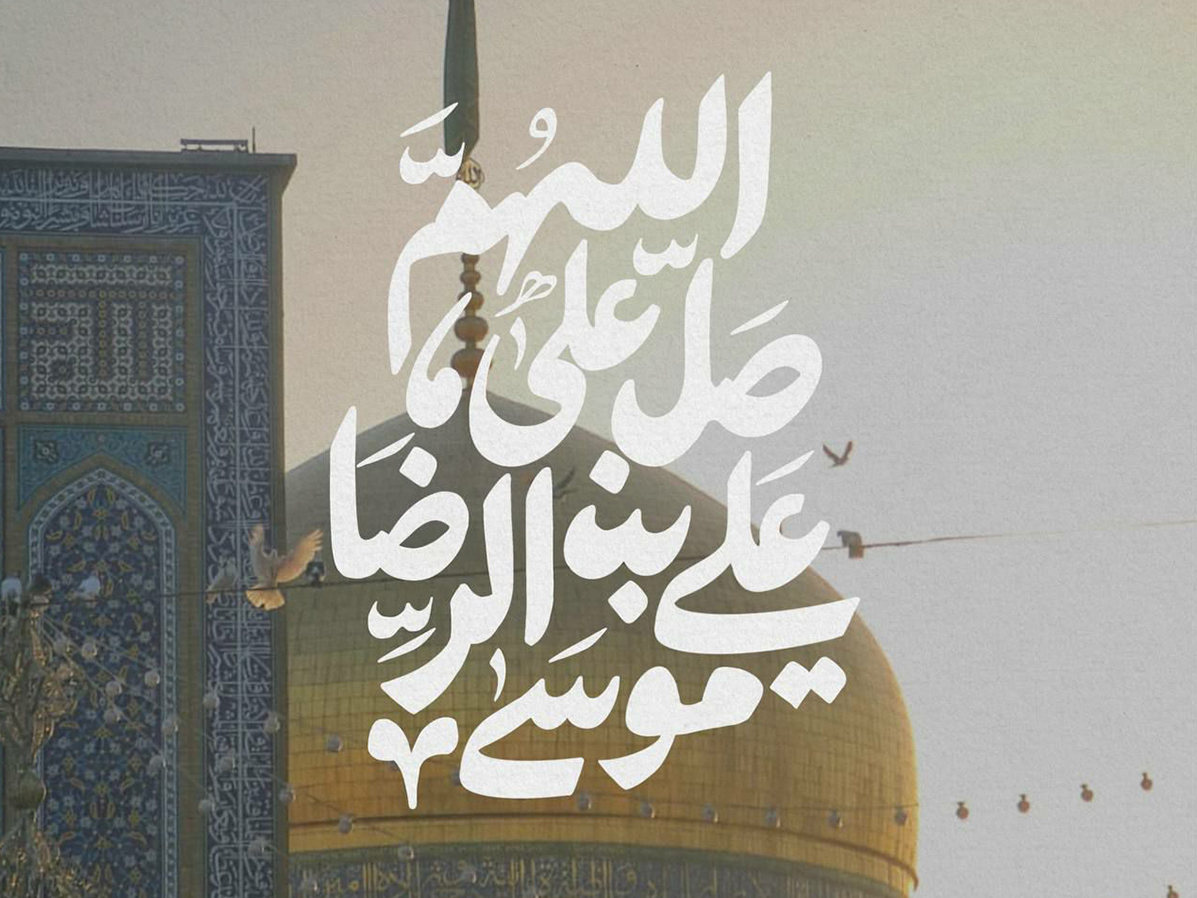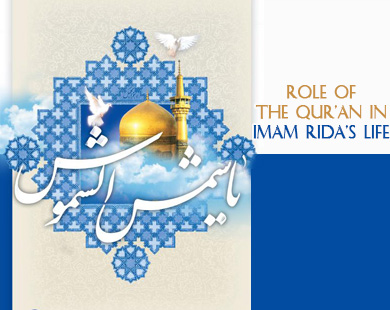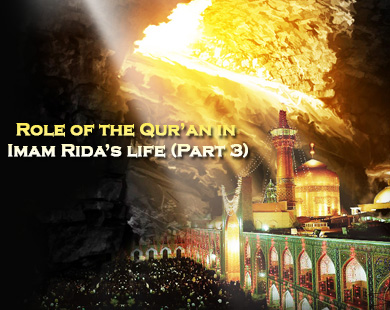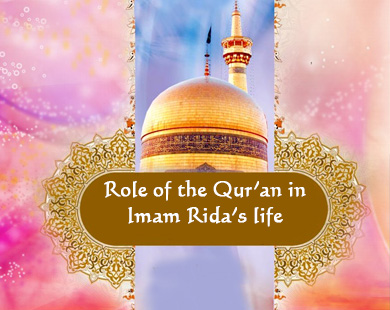After the death of Imam Musa al-Kazim, peace be on him, Imam Rida (AS) traveled to Basrah in order to produce evidence in support of his Imamate and in order to disprove the vague errors of those who deviated from the truth. He stopped at the house of al-Hassan b. Mohammed al-'Alawi and held in it a session for a group of the Muslims among whom was 'Amru b. Haddab, who deviated from the members of the House (ahl al-Bayt ), peace be on him, and showed stubbornness toward them.
He also summoned to session the Catholic and the Rabbi. Then he turned and said to them: "I have summoned you in order that you may question me about the Prophet's traditions and the Imam's signs which you may not find with anyone except with us, the members of the House, so come and question me!"
'Amru b. Haddab hastened and asked him: "Mohammed b. al-Fade al-Hashimi told us that you knew all that which Allah sent down, and that you knew all languages?"
The Imam, peace be on him, confirmed the statement of Mohammed b. al-Fadl concerning him, saying: "Mohammed b. al-Fadl is right; I told him about that."
'Amru hastened to say: "First of all I want test you through languages. This is a Roman; this is an Indian; this is a Persian; and this is a Turkish. We have brought them before you."
The Imam, peace be on him, said: "Let them say whatever they desire. I will answer each of them in his own language, Allah willing."
The non-Arabs stood before the Imam and questioned him, and he, peace be on him, answered them in their own languages. So they admired him. Then the Imam turned to 'Amru and asked him: "Do you believe me when I tell you that you will be tried in these days by murdering one of your blood relations?"
"No," was the answer, "for none knows the unseen except Allah, the Most High."
The Imam disproved 'Amru's statement, saying: "Doesn't Allah, the Most High, say: The Knower of the unseen, so He does not reveal His secrets to any except to him whom He chooses as an apostle. Allah is pleased with His Messenger, may Allah bless him and his Household , and we are the inheritors of the Messenger whom Allah informed of whatever He willed of His secrets, and he (the Messenger) informed us of what was and what will be to the Day of Resurrection.
"What I have told you about, son of Haddab, will occur five days later on. When that has occurred, you will come to know that you oppose Allah and His Apostle."
The Imam added, saying: "As for you, you will lose your sight and become blind. So you will see neither a plain nor a mountain, and this will happen a few days later on. You will perjure and be infected with leprosy."
Mohammed b. al-Fadl swore by Allah that the matter was just as the Imam had predicted.
Then 'Amru b. Haddab was asked: "Was al-Rida` truthful in what he had foretold?"
"By Allah I knew that he was truthful at the time when he told me," answered b. Haddab, "but I showed myself patient."
Then the Imam turned to the Catholic and asked him: "Has the Bible produced evidence in support of the prophecy of Mohammed, may Allah bless him and his family?"
"If the Bible has given proof of him ,we would not deny him," retorted the Catholic.
"Could you tell me about the sakana which you have in the third Book?" asked the Imam.
"It is one of Allah's attributes," replied the Catholic, "it is not permitted for us to reveal it."
"If your Lord acknowledges that it is the name of Mohammed, Jesus acknowledges him and gives good news to the children of Israel of him, then you should acknowledge him and do not deny him."
The Catholic accepted that, saying: "If you do, I will acknowledge, for I do not oppose the Bible; nor do I deny it.
The Imam continued establishing proof against him, saying: "Take (an example) from the third part in which Mohammed (p.b.u.h) has been mentioned and Jesus given good news of him."
"Give me (an example of) what you have said," retorted the Catholic.
The Imam began reciting him the part of the Gospel in which the Messenger Mohammed (p.b.u.h) has been mentioned. Then he asked the Catholic: "Who is this described one?"
"Describe him!" the Catholic demanded.
The Imam, peace be on him, began describing him, saying: "I will not describe him but through what Allah has described him. He is the owner of the she-camel, rod, and the cloak; the illiterate Prophet whom they find written down with them in the Torah and the Bible; (who) enjoins them (to do) good and forbids them (from doing) evil; makes lawful to them the good things and makes unlawful to them impure things; removes from them their burden and the shackles which were upon them; and guides (them) to the best path leading to (Allah), the most just way, and the most straight road.
"I ask you, O Catholic, by the right of Jesus, the Spirit of Allah and His Word, have you found this description of this Prophet (may Allah bless him and his family) (written) in the Gospel?"
The Catholic bowed his head, thought deeply and felt that the earth was narrow though it was wide. He could not deny the Bible, so he answered the Imam, saying: "Yes, this description is in the Bible. Jesus has mentioned this Prophet in the Bible, but the Christians have not proved true that he is your Prophet (p.b.u.h)."
Then the Imam went on establishing arguments against him and disproving his imaginations, saying: "As you have not denied the Gospel and acknowledged the description in it concerning Mohammed (p.b.u.h), then take the second Book, for it has mentioned him, his testamentary trustee (i.e. Imam Ali (AS), his daughter Fatima (AS) al-Hassan (AS), and al-Hussein (AS)."
The Catholic and the Rabbi came to know that the Imam was learned in the Torah and the Bible, and that he had knowledge of all that which was mentioned in both of them. They thought of a way to get rid of the Imam's arguments.
They doubted the Prophet Mohammed (p.b.u.h), of whom Moses and Jesus gave good news. They said: "Moses and Jesus gave good news of him, but we have not decided that he is this Mohammed (p.b.u.h). It is not permitted for us to acknowledge his prophecy because of his name Mohammed (p.b.u.h).
We doubt whether he is your Mohammed (p.b.u.h) or other than him!"
The Imam continued disproving their vague errors, saying: "You have regarded doubt as an argument. Has Allah appointed from among the children of Adam a prophet whose name is Mohammed (p.b.u.h) other than (this) Mohammed (p.b.u.h)? Have you found him (written) in one of the Books which Allah sent down upon all the prophets?"
They refrained from answering and found no vague error to cling to it. They insisted on obstinacy and denial, saying: "It is not permitted for us to confess before you that Mohammed (p.b.u.h) is your Mohammed (p.b.u.h). If we acknowledged Mohammed (p.b.u.h), his testamentary trustee, his daughter and her two sons according to what you had mentioned, then you made us adopt Islam unwillingly!"
The Imam added, saying: "As for you, O Catholic, you are safe, in the protection of Allah and of His Apostle. Nothing which you hate will issue from us toward you."
The Catholic retorted: "As you have given my security, this Prophet whose name is Mohammed (p.b.u.h), the testamentary trustee whose name is Ali (AS), this daughter whose name is Fatima (AS), these two grandsons whose names are al-Hassan (AS) and al-Hussein (AS) are in the Torah, the Bible, and the Zabur (David's Psalms)."
"Is this truthfulness and justice?" asked the Imam.
"Yes, it is truthfulness and justice," replied the Catholic.
The Catholic kept silent and acknowledged the truth, so the Imam turned to the Rabbi and said to him: "Listen, O Rabbi, to the Book so-and-so of David's Psalms."
The Rabbi said: "May Allah bless you and your father, give me (an example of) what you have."
The Imam began reciting to him the first Book of David's Psalms until he reached the names of Mohammed (p.b.u.h), Ali (AS), Fatima (AS), al-Hassan (AS), and al-Hussein (AS). Then he asked him the following questions: "I ask you, O Rabbi, by the right of Allah, is this in the Zabur of Dawud (David's Psalms)?"
"Yes, this is itself and there names are in the Zabur," answered the Rabbi.
"By the right of the ten verses which Allah sent down upon Musa (Moses), have you found the description of Mohammed (p.b.u.h), Ali (AS), Fatima (AS), al-Hassan (AS), and al-Hussein (AS) (written) in the Torah, and that they are ascribed to justice and excellence?"
The Rabbi acknowledge that.
Then the Imam continued reciting another Book of the Torah. The Rabbi admired the Imam's abundant knowledge, eloquence, and his interpreting what was mentioned concerning the Prophet, Ali (AS), Fatima (AS), al-Hassan (AS), and al-Hussein (AS). Then he said: "By Allah, O (grand) son of Mohammed (p.b.u.h), were it not for the presidency which I attained over all the Jews, I would have believed in Ahmed (i.e. Prophet Mohammed (p.b.u.h)) and follow your order. By Allah Who sent down Torah upon Musa and Zabur upon Dawud, I have never seen anyone better than you in reciting the Torah, the Bible, and the Zabur; nor have I seen anyone better than you in interpreting these Books."
The Imam's debate with them lasted for a long time until the timing of the noon prayer came, so the Imam, peace be on him, stood and led the people in the noon prayer, and then he went to carry out his personal affairs. On the following day he returned to his assembly, and they brought a Roman slave-girl before the Imam, peace be on him, that they might test the Imam. The Imam spoke to her in her own language in the presence of the Catholic. He had knowledge of her own language, so he asked her: "Whom do you love more Mohammed (p.b.u.h) or Jesus?"
"In the past I loved Jesus more," replied the slave-girl, "for I did not recognize Mohammed (p.b.u.h). After I had come to know of Mohammed (p.b.u.h), I loved him more than Jesus."
The Catholic turned to her and asked her: "You have adopted the religion of Mohammed (p.b.u.h), then do you detest Jesus?"
The slave-girl opposed his statement and said: "I seek refuge in Allah; rather I love Jesus and believe in him, but I love Mohammed (p.b.u.h) more than him."
The Imam turned to the Catholic and asked him to translate her words to the people, and he translated them to them. Then the Catholic asked the Imam to debate with a Christian from the Sind, for he had knowledge of Christianity and debates. The Imam debated with him in his own language.
Al-Sindi adopted Islam and acknowledged the Imamate of the Imam, peace be on him. Then the Imam, peace be on him, asked Mohammed b. al-Fadl to take the Christian to the bath-house, that he might bathe and purify his body from the dirt of polytheism. Mohammed took him to the bath-house and clothed him in clean clothes. Then the Imam ordered the Christian to be taken to Median (Yathrib) to learn some of his sciences. Then the Imam said farewell to his friend (the Catholic) and went to Medina al-Munawara.




















